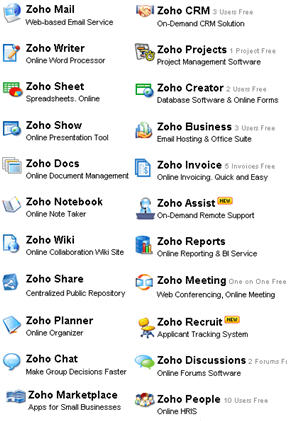Zoho CEO Sridhar Vembu: Aiming for 'contextual super apps'

Zoho has been an interesting company to me for sometime. The company's office productivity products are solid---arguably better than Google Apps---and Zoho is an enterprise player with CRM apps and other software that would appeal to small and mid-sized businesses.
In addition, Zoho is in this phase of continual improvement. The new features may not be groundbreaking by themselves, but they add up overtime. It's my running joke that if Google wants to really go hard at the enterprise it may want to purchase Zoho.
With that backdrop, Sridhar Vembu, CEO of Zoho, and Raju Vegesna, evangelist at Zoho, stopped by the CBS Interactive New York offices for a chat. Vembu spends about 80 percent of his time on technology and lets Vegesna talk products in most cases. Today, Zoho makes most of its money from two largely unknown divisions---its ManageEngine unit, which focuses on enterprise IT management software, and WebNMS, which targets mobile carriers. But Zoho Office and a constellation of enterprise apps will represent a growing portion of revenue. Toss in growth in emerging markets like India and China and Zoho's legacy businesses will be eclipsed in a few years.
Here's a recap of the conversation with Vembu:

Our conversation focused a good bit on how these areas tie together. "The key thing here is how these pieces play with each other," said Vembu. "Take CRM and our spreadsheet. It's a contextual thing like CRM and Chat. Longer term, cloud productivity is about contextual super apps."
Simply put, Vembu is looking to a world where apps that reside in separate suites are broken down into modules that can be brought into higher level apps. For instance, "Zoho Docs and e-mail use jumped when they were integrated seamlessly into CRM," explained Vembu.
On Google Apps, Vembu set up an interesting relationship. If you think about Zoho's model it's almost the flip side of Google Apps. Google is coming at apps from a collaboration perspective---chat, Gmail and calendar. "Google is focused on real-time collaboration and it's flashy and shows well," said Vembu. "We think there's more than that with a contextual view. It's CRM, then email then contextual email."
Is Gmail a rival or a partner? Vembu considers Google Apps and Gmail a friend not an enemy. In fact, Zoho can be complementary. "Gmail is viewed more as a mail hoster. We're looking to be more of a Web client and add value and integrate where ever we can. We're agnostic and want to do deep integration with anyone that wants to," said Vembu. Indeed, Zoho CRM can pull in Google Apps just as easily as its own.
When I asked about Zoho's log-in data---customers can log in with Google, Google Apps, Yahoo or Facebook accounts---Vembu had a few interesting figures. Google Apps log-ins are most popular followed by Google and then Yahoo. What about Facebook? "Facebook has a massive audience and I thought taking that log-in would be a usage driver," said Vembu. The reality is that the Facebook log-in feature could be turned off an no one would notice, said Vembu.
On the user interface, Vembu made an interesting point. Zoho's aim with this penchant for contextual applications boils down to Vembu's one tab theory. "For the user, the tab real estate is precious," he said. "We try to keep the browser in one tab for mental context and so the user doesn't have to hop around."
Regarding that browser technology, Vembu said that HTML 5 is very promising for what can be done with cloud software. I also asked about offline usage and he said that less than 1 percent of Zoho customers wanted desktop access.
On drivers of Zoho's business, Vembu said the company has three or four big applications. Zoho's CRM and project management apps are big for small companies and contractors. Email is another application that has picked up since it has been embedded with other apps. Zoho Creator is the fourth most popular app. On Zoho's sales process, Vembu noted that the company primarily sells to SMBs to line of business type executives like project managers, sales people and others. The company does have 30 to 40 integration partners, but will ultimately need bigger integrators if it's going to move into larger enterprises. One way for Zoho to enter large enterprises may be to attach to apps like SharePoint. Zoho Office already offers a connector to SharePoint. Another growth avenue for Zoho is to become packaged along with operating systems. For example, Vembu had high hopes for being integrated as a default productivity option for Ubuntu.
On Salesforce.com, Vembu said that Zoho would like to partner with the larger CRM player, but it's unlikely. Vembu noted that Zoho was set to appear on AppExchange when it launched, but Salesforce.com pulled the plug on the effort. When it comes to integration, "Salesforce won't let us," says Vembu. Indeed, the two parties do compete. Zoho CRM wins over companies with five to 10 seats---the small companies---but Vembu considers companies with 30 seats or so to be a the sweet spot. When I suggest that NetSuite may be a good partner, Vembu agrees.
Is Zoho---or Google Apps---a competitor to Microsoft Office? Vembu said that the cloud suites and Office will co-exist and the transition to cloud computing will take years. It's similar to the transition from landline phones to wireless ones. It takes time, he said. Perhaps the cloud players will be more of a threat when Office 2014 rolls around. On why Zoho hasn't been acquired, Vembu said the company wants to stay independent. Vembu considers himself an old-time capitalist that stays debt free and reinvests profits to grow. Zoho is boot strapped and VC free. It has 1,100 employees mostly in India, but is rapidly growing in Austin, Texas and has about 20 employees there.